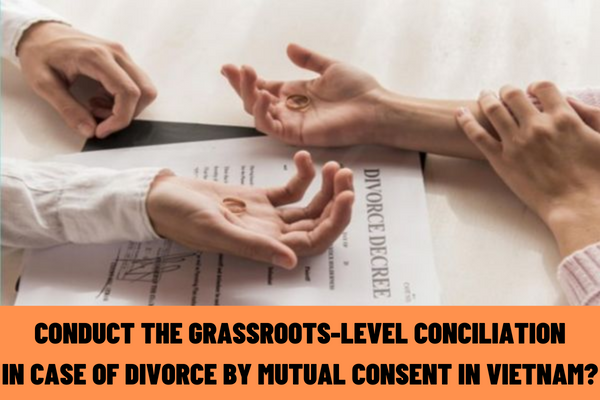In case of divorce by mutual consent in Vietnam, are we required to conduct the grassroots-level conciliation? What cases are considered irreconcilable?
In case of divorce by mutual consent, are we required to conduct the grassroots-level conciliation?
Pursuant to the provisions of Article 52 of the 2014 Law on Marriage and Family of Vietnam as follows:
Encouragement of grassroots-level conciliation
The State and society shall encourage grassroots-level conciliation when a husband or wife requests a divorce. The conciliation must comply with the law on grassroots-level conciliation.
In addition, Article 55 of the 2014 Law on Marriage and Family of Vietnam provides for divorce by mutual consent as follows:
Divorce by mutual consent in Vietnam
When both spouses request a divorce, a court shall recognize the divorce by mutual consent if seeing that the two are really willing to divorce and have agreed upon the property division, looking after, raising, care for and education of their children on the basis of ensuring the legitimate interests of the wife and children. If the spouses fail to reach agreement or have reached an agreement which -fails to ensure the legitimate interests of the wife and children, the court shall settle the divorce.
Thus, according to the above provisions, for divorce, the grassroots-level conciliation is only encouraging. Therefore, in case of divorce by mutual consent, you are not required to conduct the grassroots-level conciliation.
In addition, for conciliation at court, based on Article 54 of the 2014 Law on Marriage and Family of Vietnam:
Conciliation at court
After accepting a divorce petition, a court shall conduct conciliation in accordance with the civil procedure law.
Thus, after filing for divorce, the Court is required to conduct conciliation at court even if this is divorce by mutual consent.

In case of divorce by mutual consent in Vietnam, are we required to conduct the grassroots-level conciliation? What cases are considered irreconcilable? (Image from the Internet)
How to settle the property of husband and wife upon divorce by mutual consent?
Article 59 of the 2014 Law on Marriage and Family of Vietnam stipulates the principles of settlement of property of husband and wife upon divorce as follows:
Principles of settlement of property of husband and wife upon divorce
1. The settlement of property shall be agreed upon by the concerned parties in case of applying the statutory matrimonial property regime. If they fail to reach agreement thereon, at the request of a spouse or both, a court shall settle it according to Clauses 2, 3, 4 and 5 of this Article and Articles 60, 61, 62, 63 and 64 of this Law.
In case of applying the agreed matrimonial property regime, the settlement of property upon divorce must comply with such agreement. In case the agreement is insufficient or unclear, the settlement must comply with corresponding provisions of Clauses 2, 3, 4 and 5 of this Article and Articles 60, 61, 62, 63 and 64 of this Law.
2. Common property shall be divided into two, taking into account the following factors:
a/ Circumstances of the family, husband and wife;
b/ Each spouse’s contributions to the creation, maintenance and development of common property. The housework done in the family by a spouse shall be regarded as income-generating labor;
c/ Protecting the legitimate interests of each spouse in their production, business and career activities to create conditions for them to continue working to generate incomes;
d/ Each spouse’s faults in the infringement of spousal rights and obligations.
3. Common property of husband and wife shall be divided in kind, if impossible to be divided in kind, common property shall be divided based on its value. The partner who receives the property in kind with a value bigger than the portion he/she is entitled to receive shall pay the value difference to the other.
4. Separate property of a spouse shall be under his/her ownership, except for separate property already merged into common property in accordance with this Law.
A spouse who requests division of separate property which has been merged into or mixed with common property shall be paid for the value of his/her property contributed to common property, unless otherwise agreed by husband and wife.
5. The lawful rights and interests of the wife, minor children or adult children who have lost their civil act capacity or have no working capacity and no property to support themselves shall be protected.
6. The Supreme People’s Court shall assume the prime responsibility for, and coordinate with the Supreme People’s Procuracy and the Ministry of Justice in, guiding this Article.
Thus, according to the above provisions, when resolving the divorce by mutual consent, the common property of the husband and wife will be divided according to the agreement. If the husband and wife cannot reach an agreement, the court will divide the property into the two, but taking into account a number of factors.
What cases are considered irreconcilable when resolving divorce?
In Article 207 of the 2015 Civil Procedure Code of Vietnam on civil lawsuits which cannot be conciliated:
Civil lawsuits which cannot be conciliated
1. The defendants or the persons with relevant interests and duties are intentionally absent though having been duly summoned twice by courts.
2. The involved parties cannot take part in the conciliation for plausible reasons.
3. The involved parties being wives or husbands in divorce cases have lost their civil act capacity.
4. One of involved parties applies for non-conciliation.
Thus, conciliation before the divorce cannot be conducted if:
- Both spouses are duly summoned twice by courts but are still intentionally absent.
- Both spouses cannot take part in the conciliation for plausible reasons.
- The spouse in a divorce case is a person who has lost his/her civil act capacity.
- One of the spouses proposes applies for non-conciliation.
LawNet